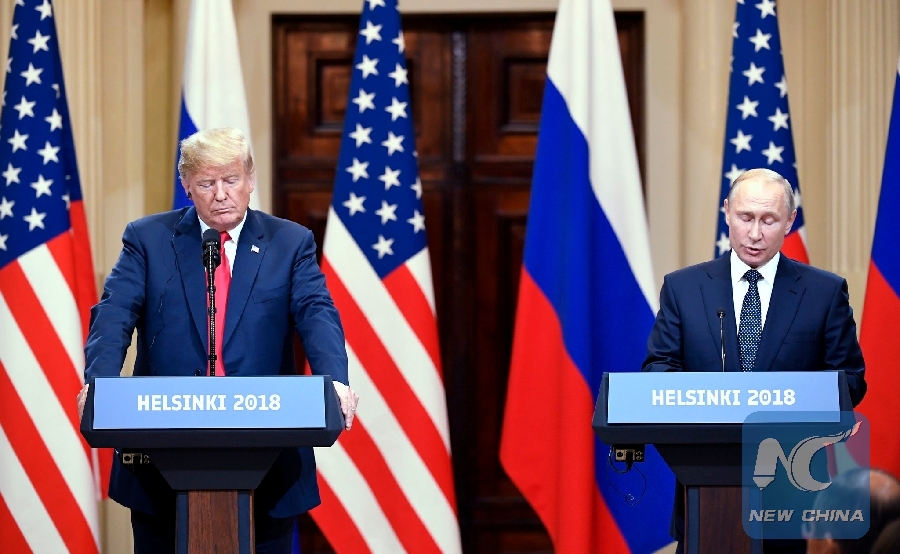
File Photo: U.S. President Donald Trump (L) and Russian President Vladimir Putin attend a joint press conference in Helsinki, Finland, on July 16, 2018. (Xinhua/Lehtikuva/Jussi Nukari)
WASHINGTON, Dec. 5 (Xinhua) -- Washington has sent an "ultimatum" to Moscow by threatening to withdraw from the Intermediate-Range Nuclear Forces (INF) Treaty in the following two months, a move experts believe is self-centered and counterproductive.
U.S. Secretary of State Mike Pompeo said Tuesday in Brussels that the United States would suspend its obligations under the INF Treaty in 60 days unless Russia returns to full compliance with the agreement.
"The burden falls on Russia to make the necessary changes," Pompeo said in a press conference of NATO foreign ministers meeting.
Russia opposes the U.S. withdrawal from the treaty and will respond "in an appropriate manner," Russian President Vladimir Putin responded on Wednesday.
For years, Moscow and Washington have traded accusations of non-compliance with the INF Treaty, which was signed in 1987 between the Soviet Union and the United States on the elimination of intermediate-range and shorter-range missiles.
It marked the first-ever pact reached by Washington and Moscow on nuclear disarmament and a major step forward in restricting arms race.
Experts say Washington's withdrawal would put the whole world in an arms control crisis and the United States seeks to gain more from quitting the deal.
"Russia is not the major reason of U.S. decision to withdraw from the treaty; the United States itself is," said Li Bin, a senior fellow of Nuclear Policy Program at the Carnegie Endowment for International Peace.
Li said some people in the United States believe that "no other country could prevail the United States in an arms race" without the agreements.
As far back as 2013, Pentagon was considering various technologies that the United States could develop should Washington walk away from the INF Treaty, according to U.S. media reports.
Moscow also questioned Washington's integrity by crafting such a hedging strategy with regard to the INF Treaty.
Putin said on Wednesday that the U.S. Congress allocated money for the development of missiles banned by the treaty even before Washington announced its withdrawal from the pact.
The abandonment of the deal also aroused speculation on whether the United States would develop and deploy ground-based intermediate-range missiles in the near future.
"Since Democrats have controlled the House of Representatives, I doubt they would be supportive to those systems because of the cost, and the need is not proven," said Mark Fitzpatrick, executive director of International Institute of Strategic Studies-Americas.
Daryl Kimball, executive director of the advocacy group Arms Control Association, said on Tuesday that if NATO members want to preserve the INF Treaty that has enhanced their security for more than two decades, they should insist that the United States and Russia exhaust diplomatic options.
Unfortunately, Pompeo provided no indication that the United States wanted to make a final effort to save the treaty by engaging in talks with Russia to address the compliance concerns raised by Washington and Moscow, said Kimball.
Besides, the potential collapse of the INF Treaty would leave the fate of the 2010 New Strategic Arms Reductions Treaty (New START) between Washington and Moscow uncertain.
Breaking arms control agreements was much easier than concluding them, said Alexey Arbatov, an international security expert of Moscow-based Primakov National Research Institute of World Economy and International Relations.
"But history shows that rejecting arms control agreements never improves one's security and always damages it," said Arbatov.

